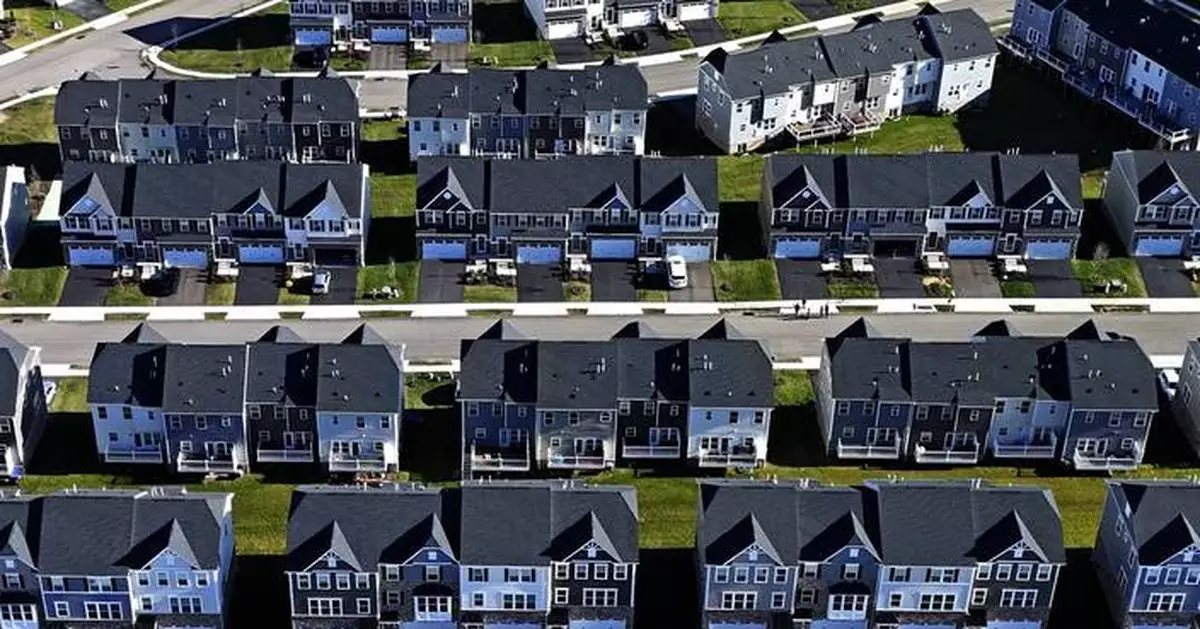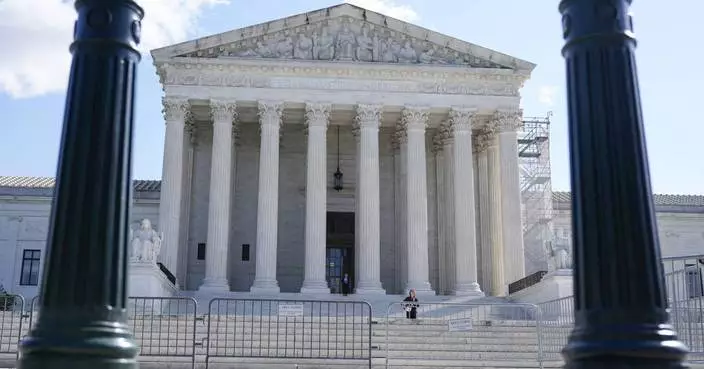The average rate on a 30-year mortgage fell this week to its lowest level in more than a year, a welcome affordability boost for prospective home shoppers and homeowners looking to refinance their home loan to a lower rate.
The rate fell to 6.47% from 6.73% last week, mortgage buyer Freddie Mac said Thursday. A year ago, the rate averaged 6.96%.
This is the second straight weekly drop in the average rate. It’s now the lowest it’s been since mid-May last year, when it was 6.39%.
Borrowing costs on 15-year fixed-rate mortgages, popular with homeowners refinancing their home loans, also fell this week, pulling the average rate down to 5.63% from 5.99% last week. A year ago, it averaged 6.34%, Freddie Mac said.
“The decline in mortgage rates does increase prospective homebuyers’ purchasing power and should begin to pique their interest in making a move,” said Sam Khater, Freddie Mac’s chief economist. “Additionally, this drop in rates is already providing some existing homeowners the opportunity to refinance.”
After jumping to a 23-year high of 7.79% in October, the average rate on a 30-year mortgage has mostly hovered around 7% this year — more than double what it was just three years ago.
The elevated mortgage rates, which can add hundreds of dollars a month in costs for borrowers, have discouraged home shoppers, extending the nation’s housing slump into its third year.
Sales of previously occupied U.S. homes fell in June for the fourth month in a row. And sales of new single-family homes fell last month to the slowest annual pace since November.
Rates have mostly eased in recent weeks as signs of waning inflation and a cooling job market have raised expectations that the Federal Reserve will cut its benchmark interest rate next month for the first time in four years.
Mortgage rates are influenced by several factors, including how the bond market reacts to the central bank’s interest rate policy decisions. That can move the trajectory of the 10-year Treasury yield, which lenders use as a guide to pricing home loans.
This week’s drop in mortgage rates follows a pullback in the 10-year Treasury yield, which briefly slid last week to around 3.7% after worse-than-expected labor market data rattled investors, pushing up demand for bonds.
The yield, which topped 4.7% in late April, was at 4% in afternoon trading in the bond market on Thursday.
If bond yields continue to decline in anticipation of the Fed lowering rates this fall, that could lead mortgage rates to ease further, though most economists expect the average rate on a 30-year home loan to remain above 6% this year.
Even so, the recent pullback in mortgage rates has already spurred a surge in homeowners seeking to refinance. Applications for mortgage refinance loans jumped last week to their highest level in two years.
Rates may have to come down more before many would-be homebuyers facing record-high housing prices and a chronic shortage of properties on the market can afford to buy a home.
“Buyers are biding their time, waiting for rates to fall further and for more inventory to come onto the market,” said Lisa Sturtevant, chief economist at Bright MLS.

FILE - A housing development in Cranberry Township, Pa., is shown on March 29, 2024. (AP Photo/Gene J. Puskar, File)
WASHINGTON (AP) — Facing a government shutdown deadline, the Senate rushed through final passage early Saturday of a bipartisan plan that would temporarily fund federal operations and disaster aid, dropping President-elect Donald Trump's demands for a debt limit increase into the new year.
House Speaker Mike Johnson had insisted Congress would “meet our obligations” and not allow federal operations to shutter ahead of the Christmas holiday season. But the day's outcome was uncertain after Trump doubled down on his insistence that a debt ceiling increase be included in any deal — if not, he said in an early morning post, let the closures “start now.”
The House approved Johnson's new bill overwhelmingly, 366-34. The Senate worked into the night to pass it, 85-11, just after the deadline. At midnight, the White House said it had ceased shutdown preparations.
“This is a good outcome for the country, ” Johnson said after the House vote, adding he had spoken with Trump and the president-elect “was certainly happy about this outcome, as well.”
President Joe Biden, who has played a less public role in the process throughout a turbulent week, was expected to sign the measure into law Saturday.
“There will be no government shutdown," Senate Majority Leader Chuck Schumer said.
The final product was the third attempt from Johnson, the beleaguered House speaker, to achieve one of the basic requirements of the federal government — keeping it open. And it raised stark questions about whether Johnson will be able to keep his job, in the face of angry GOP colleagues, and work alongside Trump and billionaire ally Elon Musk, who called the legislative plays from afar.
Trump's last-minute demand was almost an impossible ask, and Johnson had almost no choice but to work around his pressure for a debt ceiling increase. The speaker knew there wouldn’t be enough support within the GOP majority to pass any funding package, since many Republican deficit hawks prefer to slash the federal government and certainly wouldn’t allow more debt.
Instead, the Republicans, who will have full control of the White House, House and Senate next year, with big plans for tax cuts and other priorities, are showing they must routinely rely on Democrats for the votes needed to keep up with the routine operations of governing.
“So is this a Republican bill or a Democrat bill?” scoffed Musk on social media ahead of the vote.
The drastically slimmed-down 118-page package would fund the government at current levels through March 14 and add $100 billion in disaster aid and $10 billion in agricultural assistance to farmers.
Gone is Trump’s demand to lift the debt ceiling, which GOP leaders told lawmakers would be debated as part of their tax and border packages in the new year. Republicans made a so-called handshake agreement to raise the debt limit at that time while also cutting $2.5 trillion in spending over 10 years.
It’s essentially the same deal that flopped the night before in a spectacular setback — opposed by most Democrats and some of the most conservative Republicans — minus Trump’s debt ceiling demand.
But it's far smaller than the original bipartisan accord Johnson struck with Democratic and Republican leaders — a 1,500-page bill that Trump and Musk rejected, forcing him to start over. It was stuffed with a long list of other bills — including much-derided pay raises for lawmakers — but also other measures with broad bipartisan support that now have a tougher path to becoming law.
House Democrats were cool to the latest effort after Johnson reneged on the hard-fought bipartisan compromise.
Rep. Rosa DeLauro, the top Democrat on the Appropriations Committee, said it looked like Musk, the wealthiest man in the world, was calling the shots for Trump and Republicans.
“Who is in charge?” she asked during the debate.
Still, the House Democrats put up more votes than Republicans for the bill's passage. Almost three dozen conservative House Republicans voted against it.
“The House Democrats have successfully stopped extreme MAGA Republicans from shutting down the government, crashing the economy and hurting working-class Americans all across the nation,” House Democratic Leader Hakeem Jeffries said, referring to Trump's “Make America Great Again” slogan.
In the Senate, almost all the opposition came from the Republicans — except independent Sen. Bernie Sanders, who said Musk's interference was “not democracy, that's oligarchy.”
Trump, who has not yet been sworn into office, is showing the power but also the limits of his sway with Congress, as he intervenes and orchestrates affairs from Mar-a-Lago alongside Musk, who is heading up the new Department of Government Efficiency.
The incoming Trump administration vows to slash the federal budget and fire thousands of employees and is counting on Republicans for a big tax package. And Trump's not fearful of shutdowns the way lawmakers are, having sparked the longest government shutdown in history in his first term at the White House.
“If there is going to be a shutdown of government, let it begin now,” Trump posted early in the morning on social media.
More important for the president-elect was his demand for pushing the thorny debt ceiling debate off the table before he returns to the White House. The federal debt limit expires Jan. 1, and Trump doesn't want the first months of his new administration saddled with tough negotiations in Congress to lift the nation's borrowing capacity. Now Johnson will be on the hook to deliver.
“Congress must get rid of, or extend out to, perhaps, 2029, the ridiculous Debt Ceiling,” Trump posted — increasing his demand for a new five-year debt limit increase. "Without this, we should never make a deal."
Government workers had already been told to prepare for a federal shutdown that would send millions of employees — and members of the military — into the holiday season without paychecks.
Biden has been in discussions with Jeffries and Schumer, but White House press secretary Karine Jean-Pierre said: “Republicans blew up this deal. They did, and they need to fix this.”
As the day dragged on, Senate Republican Leader Mitch McConnell stepped in to remind colleagues “how harmful it is to shut the government down, and how foolish it is to bet your own side won’t take the blame for it.”
At one point, Johnson asked House Republicans at a lunchtime meeting for a show of hands as they tried to choose the path forward.
It wasn’t just the shutdown, but the speaker’s job on the line. The speaker’s election is the first vote of the new Congress, which convenes Jan. 3, and some Trump allies have floated Musk for speaker.
Johnson said he spoke to Musk ahead of the vote Friday and they talked about the “extraordinary challenges of this job.”
Associated Press writers Kevin Freking, Stephen Groves, Mary Clare Jalonick, Darlene Superville and Bill Barrow contributed to this report.
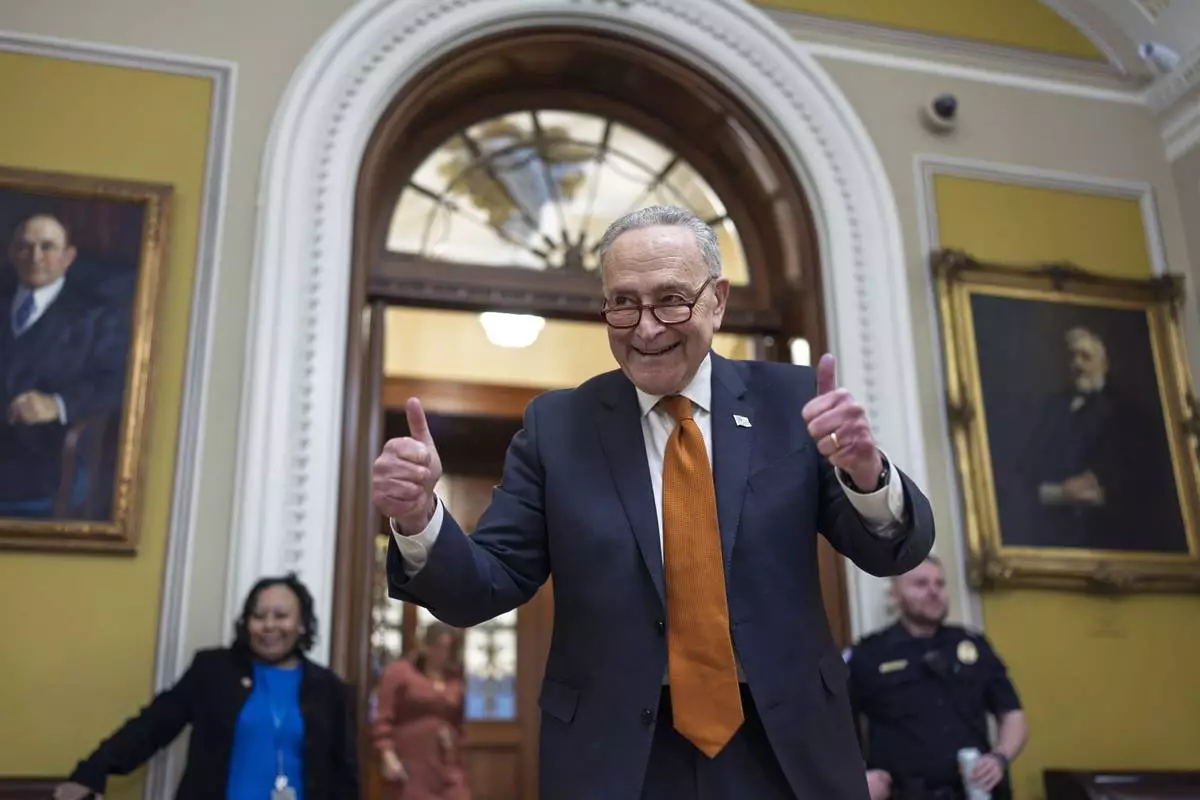
Senate Majority Leader Chuck Schumer, D-N.Y., celebrates as the Senate begins voting on the government funding bill just in time to meet the midnight deadline, at the Capitol in Washington, Friday, Dec. 20, 2024. (AP Photo/J. Scott Applewhite)
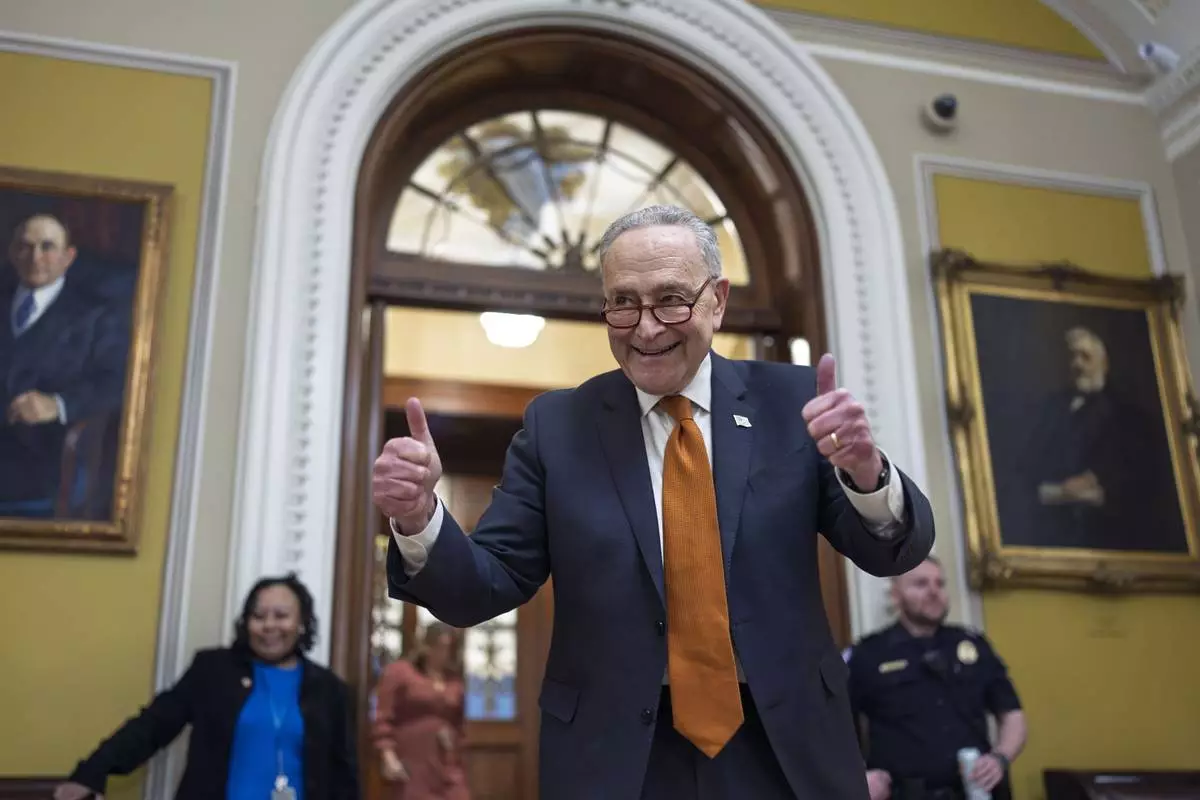
Senate Majority Leader Chuck Schumer, D-N.Y., celebrates as the Senate begins voting on the government funding bill just in time to meet the midnight deadline, at the Capitol in Washington, Friday, Dec. 20, 2024. (AP Photo/J. Scott Applewhite)

Speaker of the House Mike Johnson, R-La., talks to reporters after passing the funding bill to avert the government shutdown at the Capitol in Washington, Friday, Dec. 20, 2024. (AP Photo/Jose Luis Magana)

Speaker of the House Mike Johnson, R-La., talks to reporters after passing the funding bill to avert the government shutdown at the Capitol in Washington, Friday, Dec. 20, 2024. (AP Photo/Jose Luis Magana)
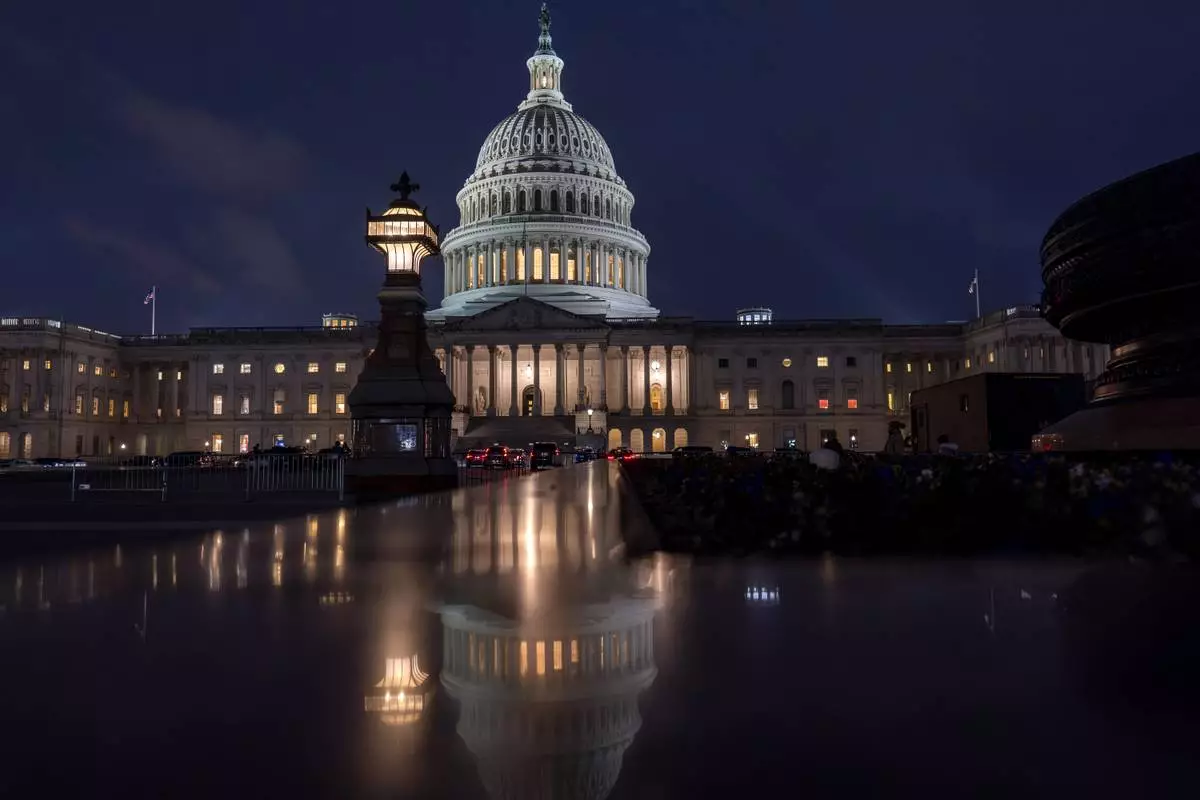
The Capitol is pictured in Washington, Friday, Dec. 20, 2024. (AP Photo/J. Scott Applewhite)
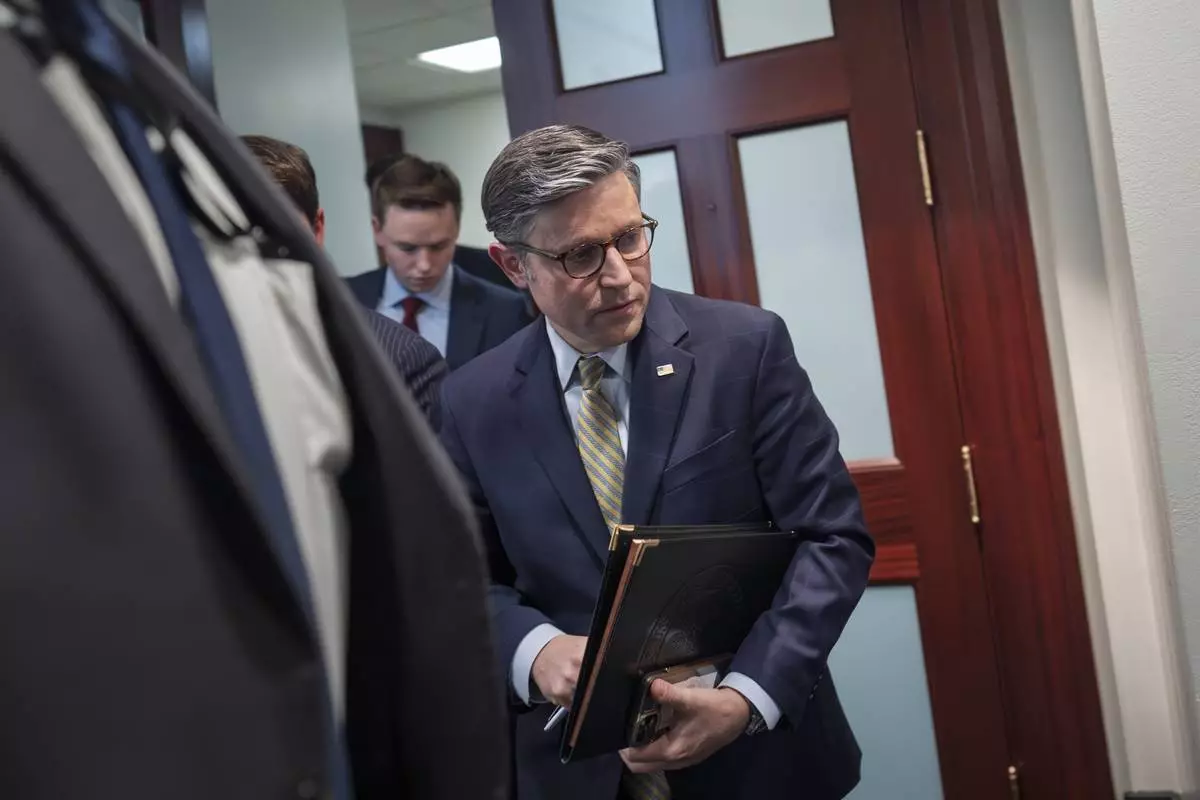
Speaker of the House Mike Johnson, R-La., emerges from a closed-door meeting with fellow Republicans at the Capitol in Washington, Friday, Dec. 20, 2024. (AP Photo/J. Scott Applewhite)
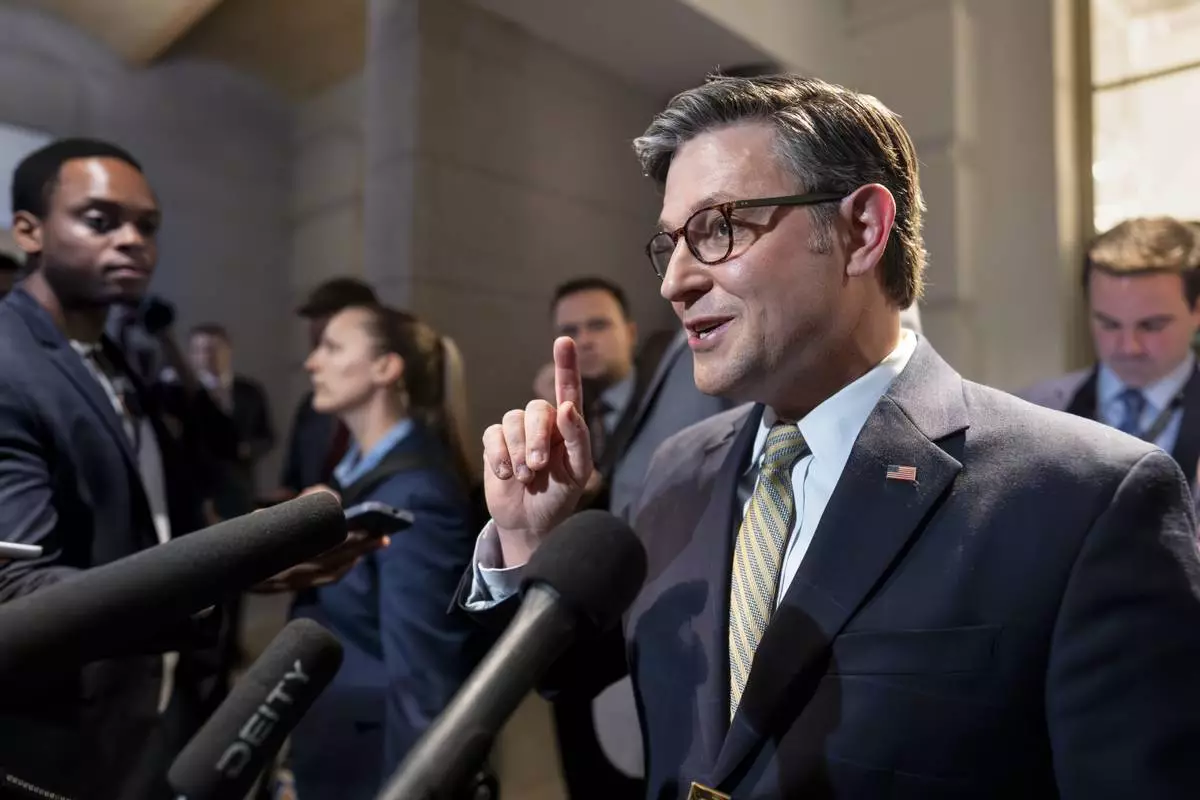
Speaker of the House Mike Johnson, R-La., emerges from a closed-door meeting with fellow Republicans at the Capitol in Washington, Friday, Dec. 20, 2024. (AP Photo/J. Scott Applewhite)
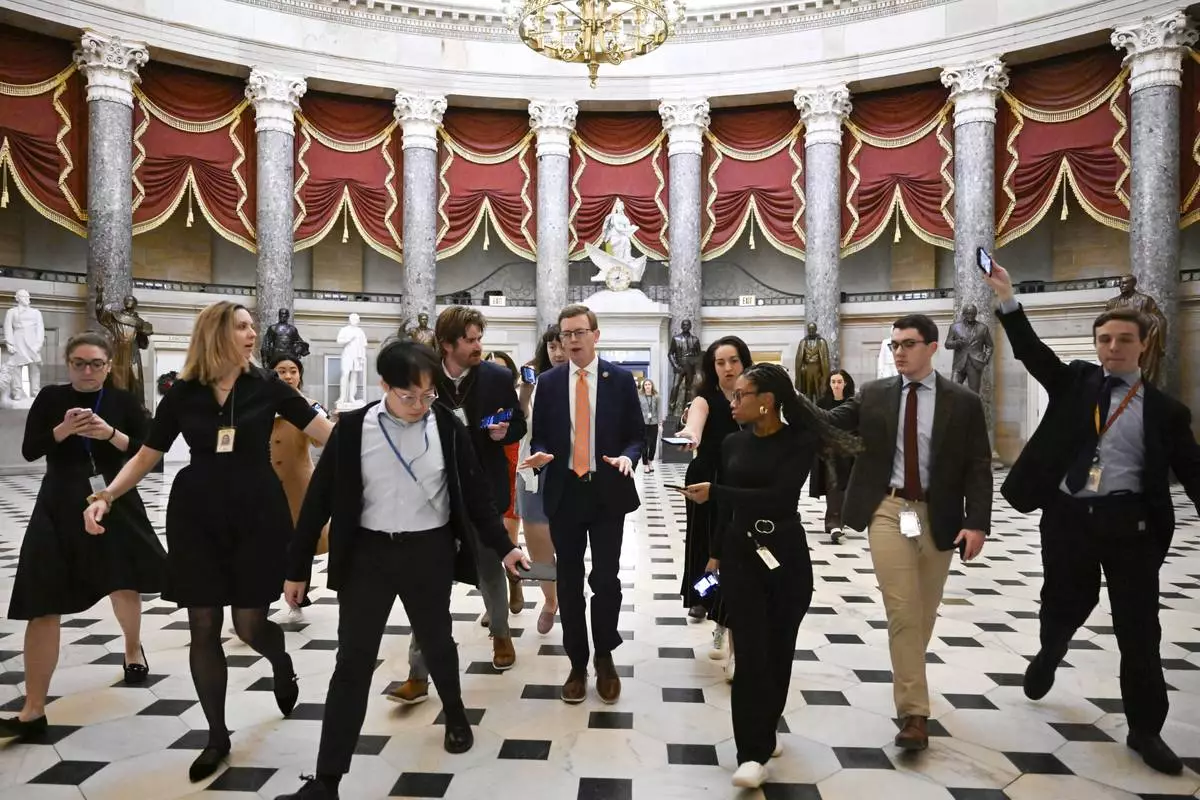
Rep. Dusty Johnson, R-S.D., talks with reporters after attending a meeting with Speaker of the House Mike Johnson, R-La., as the House works on a spending bill to avert a shutdown of the Federal Government, Friday, Dec. 20, 2024, at the Capitol in Washington. (AP Photo/John McDonnell)
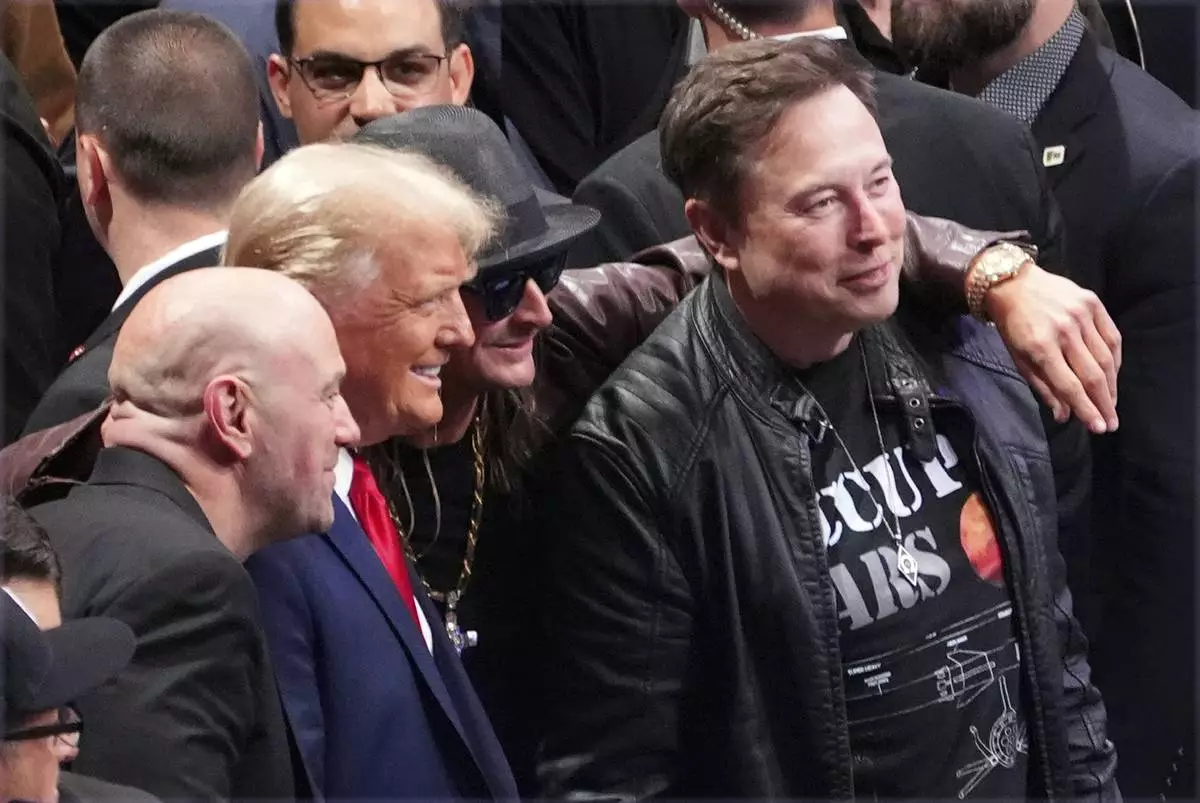
FILE - President-elect Donald Trump poses for a photo with Dana White, Kid Rock and Elon Musk at UFC 309 at Madison Square Garden, Nov. 16, 2024, in New York. (AP Photo/Evan Vucci, File)
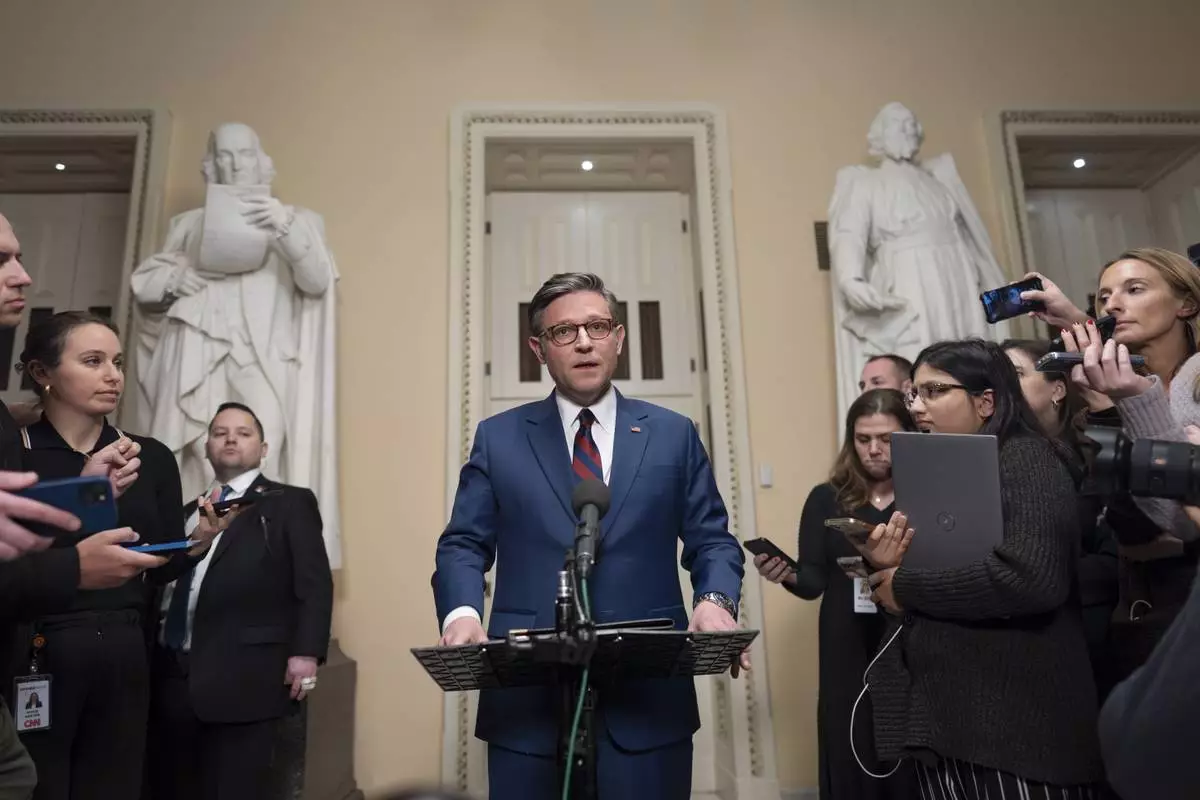
Speaker of the House Mike Johnson, R-La., talks briefly to reporters just before a vote on an interim spending bill to prevent a government shutdown, at the Capitol in Washington, Thursday, Dec. 19, 2024. The vote failed to pass. (AP Photo/J. Scott Applewhite)
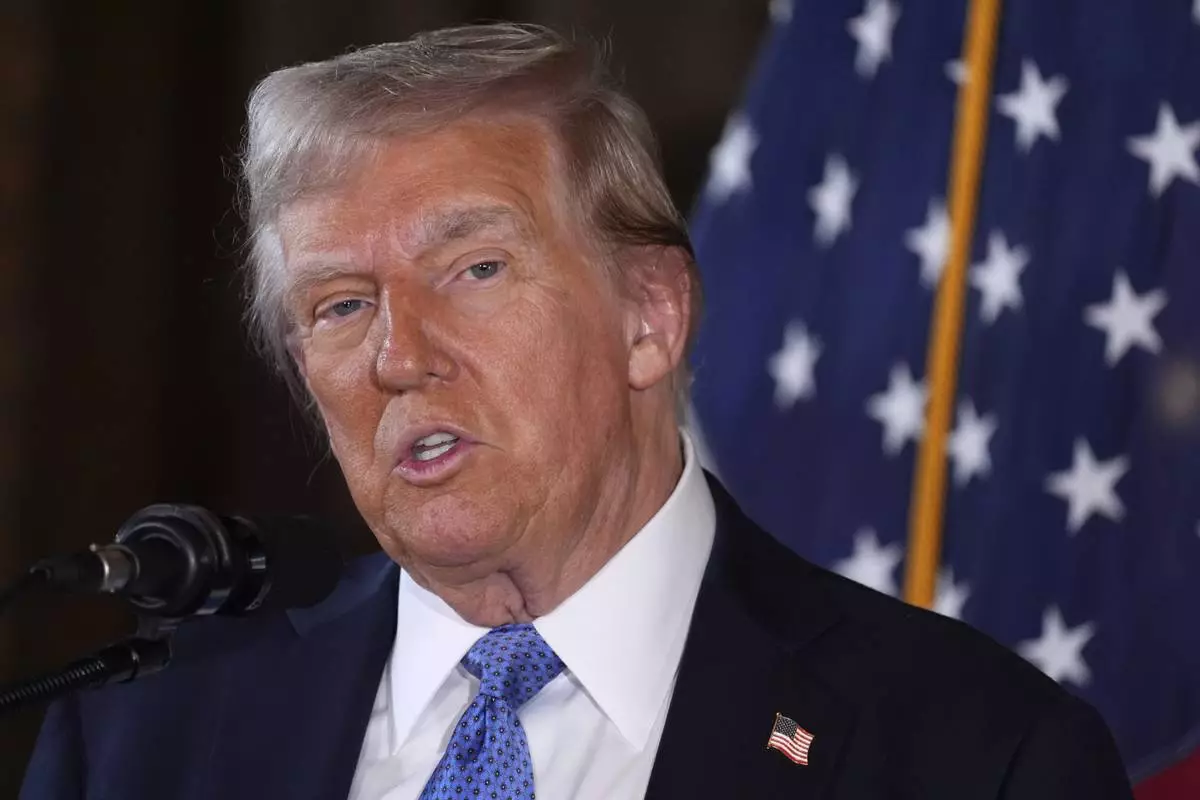
President-elect Donald Trump speaks during a news conference at Mar-a-Lago, Monday, Dec. 16, 2024, in Palm Beach, Fla. (AP Photo/Evan Vucci)



